We need no rocket science to know how important it is to grow your users. In the booming tech sector of today, you need an integrated ‘cross-platform’ framework for apps. This is simple; building and marketing apps on multiple platforms can help to expand your product and reach more customers at affordable prices.

The current competitive digital space is a tough challenge for developers. This forces them to seek out apps that give them the greatest possible results in minimal effort.
What is Cross Platform Development?
This approach allows developers to build and support mobile applications for multiple platforms (Android, iPhone, Android, and Windows). Hybrid applications have a native appearance because they integrate native software code with independent code, which can be customized for multiple systems.
It makes it very easy in software development to reuse code once to create new features. To write cross-platform programming applications, developers can only write intermediate programming languages like HTML, JavaScript, and CSS, not adapted to any device.
In today’s rapidly changing and Darwinian mobile apps, businesses will never lose their place on either platform: Google Play Store or Apple. Budgeting is often difficult in the case of a company using native apps.
It’s because of these factors that cross-platform applications are now an unsurpassed choice for businesses who want to develop applications for Android and Apple devices.
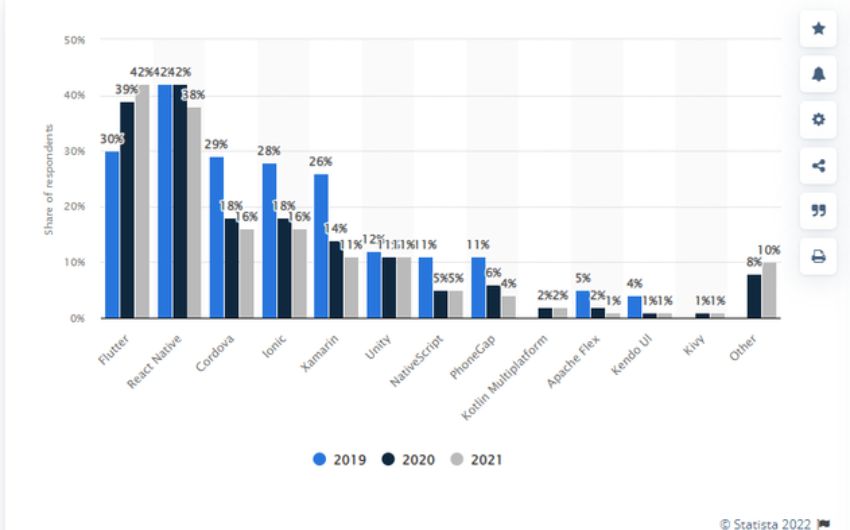
Cross-platform mobile frameworks used by software developers worldwide
Popular Cross Platform Frameworks
- Qt
Qt was published on October 15, 1995, as a free software toolkit. The tools include C++ and Java scripting for the development of cross platform apps for iOS, Mac OS, Linux, and embedded systems. Qt allows for the development of cross platform app/graphical interfaces that can be installed on smartphones, desktops, or an embedded system.
Qt supports the compilers Visual Studio, GCC, and PHP using extensions. The Tools in the Qt Library include the Qt Creator for C++ and also contains QML. Other Qt functions include parsing and storage of data in SQL databases. Programmer: C++.
- Cordova
Apache Cordova was previously PhoneGap—an open-source framework that uses JavaScript, HTML, and CSS. Apache Cordova is an open-source fork of PhoneGap that was acquired in 2011. Adobe has since discontinued PhoneGap in 2020. Cordova is a hybrid application whose content is purely native but purely web-based. Integrating Adobe Experience Manager services can further enhance content management and delivery, ensuring seamless digital experiences across platforms.

Cordova supports HTML Scripting, CSS, and Java Scripting depending on the platform on any computer. Cordova Apps utilizes standards-compatible APIs to access a range of functions of the product like sensors, network status, etc. Scripting languages: HTML, CSS & Java.
- Codename One
Codename One was designed by a co-founder of LWUIT and is a widely-popular open source writing framework. CodenameOne is an innovation in mobile development based on work done at Sun Microsystems by former Sun Developers. The main attraction of the app is the native platform that allows the author of native code directly from Java to Kotlin.
- Flutter
Beautiful Native Apps for a Quick Time Flutter is a cross platform framework designed to create native interfaces for Android and iOS devices. In May 2018, Google announced a new stability build called flutter1.7. Flutter has been developed by Google as a unified platform app framework which also provides the framework for coding the Android Native Framework.

It uses the same core principles as other react native development services, but it seems to have a lot of advantages over them. The main advantage is that it’s open source and also supports Windows and Linux platforms that other frameworks don’t support out of the box.
- Corona SDK
Corona is able to develop 2D mobile apps on almost any mobile platform, including iPads, Android, and Windows. It can help with a 10-fold increase in development speed for mobile games. It delivers remarkable results due to the backend framework delivering reliable performance with Lua, a lightweight and multi-parallel program language.

The language concentrates on the key elements for the development, including speed, portability, extensibility, and scalability. This framework works in Mac OS X as well as Windows with real-time testing capabilities.
- Xamarin
Several cross-platform application framework platforms have different capabilities versus those described in this section. It provides an efficient framework for the development of Android, iPhone, and Android applications by C# rather than JS libraries or HTML. Using 90% of code, developers can build a mobile app on three separate systems. With amazing APIs, Xamarin provides an aesthetic-like app with the ability to make an app much easier to understand.
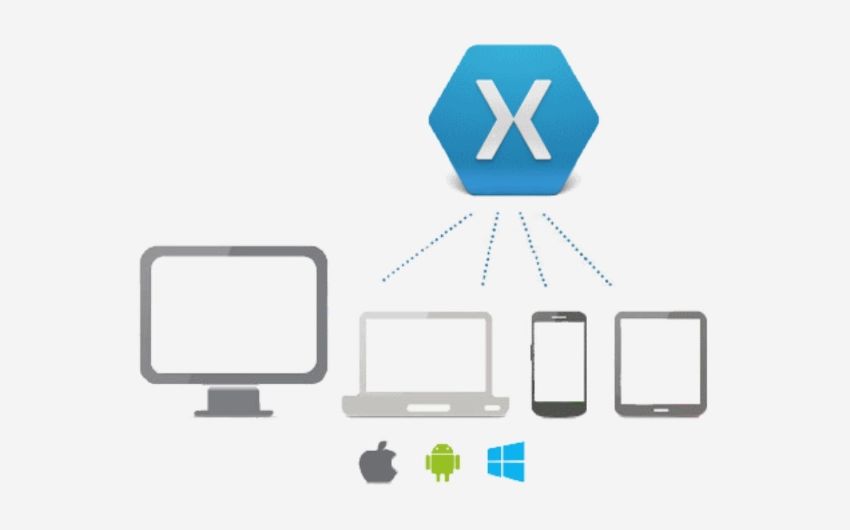
Xamarin has several features explaining its advantages as a cross-platform mobile application development solution that is available both in open source and commercial versions.
The benefits of using Xamarin include:
– Easier to use than native applications
– Cross platform compatibility
– Ability to host your app on multiple app stores
- React Native
When discussing cross-platform app frameworks, you cannot ignore React Native. It is an implementation framework based on JavaScript that can be used for creating coding that makes mobile apps native. Due to these remarkable features, React Native Development Services providers has huge as a preferred platform for development and business users too. Native React includes react and JavaScript. JS offers developers an advantage in developing modules in Objective-C, Swift, and Java languages.
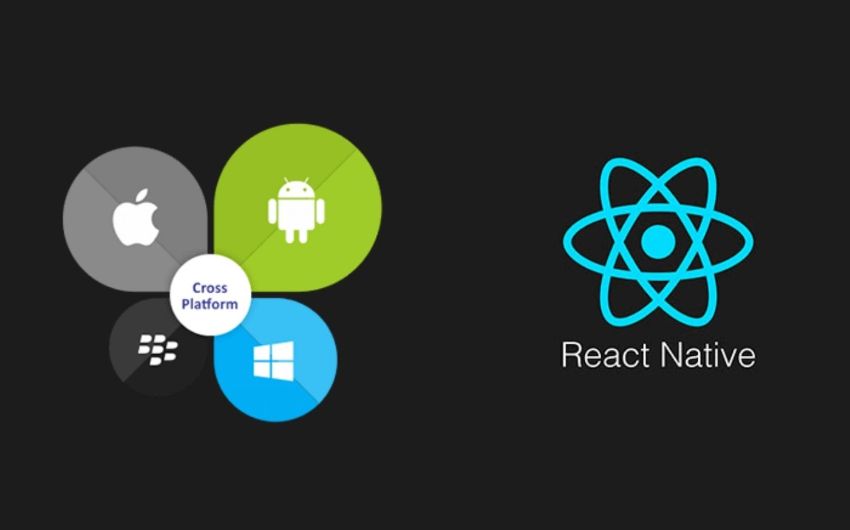
It was developed by Facebook in order to target the mobile market in 2008. Nowadays it is the most popular front-end JavaScript library used by companies like Airbnb, Netflix, and Uber.
- Node.js
NodeJS provides a powerful platform for building apps on various platforms. Nodes. JavaScript is a runtime framework developed with Chrome V8 JavaScript. The Open Source environment provides support for server-side and scaler network apps for developers. Node.js is an inherently powerful cross-platform application. The framework supports multiple concurrent links. It also features dozens of Java script modules for a smooth development environment.
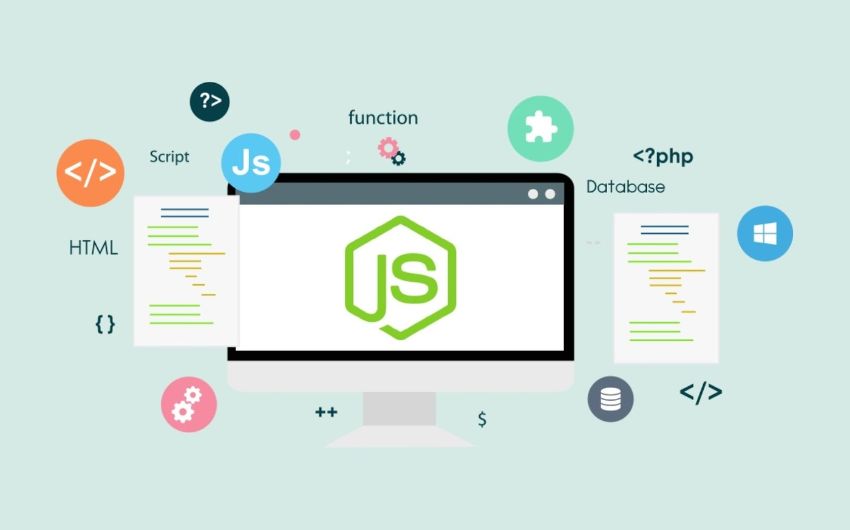
- PhoneGap
Phone Gap (Cordova) is a cross-platform framework based on CSS, JavaScript, and HTML5. The company is offering a cloud solution for developers providing the option to publish the app as the result of a developer review. The company creates amazing app development tools by utilizing web technologies. Another huge benefit of PhoneGap is that it includes all device functions such as a phonebook, camera, and GPS.
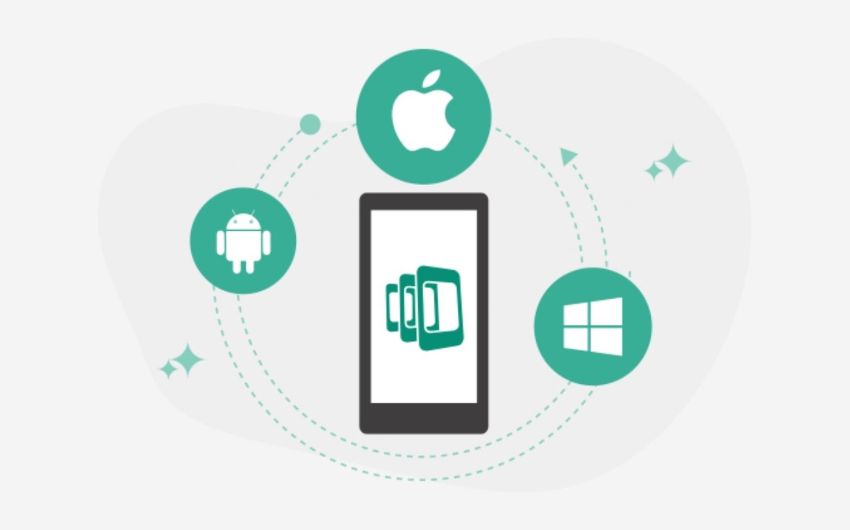
It works with native iOS, Android, and web applications with a single codebase. Developers can use this framework to build apps in three different languages – Javascript, Objective-C, and Ruby.
Phone Gap Cross Platform Framework also provides product support for over 1 million devices across all major OS’s (iOS, Android, Linux).
- Sencha Touch
Introduced nearly ten years ago, Sencha Touch helps developers create cross platform web apps that use hardware acceleration technologies. Sencha Touch allows for implementing secure UI-based components and libraries with ease. Moreover, the application could be designed and managed by any enterprise easily and quickly. There are several remarkable characteristics in its construction.
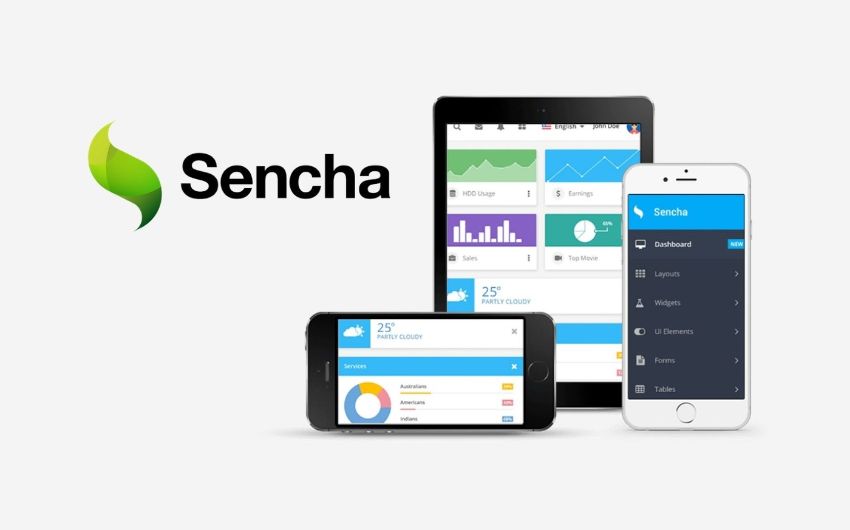
It allows developers to create and deploy apps to iPhone, Android, Blackberry, WebOS, Windows, and more.
- Accelerator Titanium
Accelerator Titanium is an open source framework that provides cross-platform support for a variety of front-end web technologies like HTML5, CSS3, AngularJS, and Bootstrap.
Appcelerator has a broad range of features to support mobile application development and can easily integrate into a wide array of software platforms. It’s very good for creating crossplatform apps on a single codebase. The organization focuses primarily on reducing the development cycle using native elements in JavaScript.
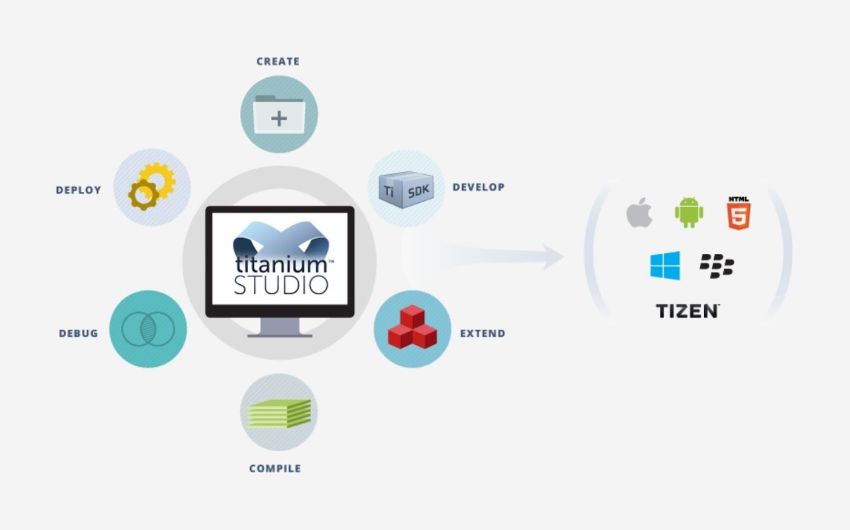
This framework offers many benefits for the developers because it can help them avoid having to write code for specific platforms or use specific frameworks. It also offers support for mobile devices with its scalable, responsive design that helps in improving app performance on each platform.
- NativeScript
NativeScript is a powerful free cross platform framework written using JavaScript. It can be an excellent choice if the developer seeks WORA functionality. NativeScript enables developers to use the existing plugin directly on NPM to build the project.
NativeScript has a huge community of developers and is used by companies like TripAdvisor and AirBnB. It has native support for iOS, Android, Xamarin, and even Windows 10 Universal apps.
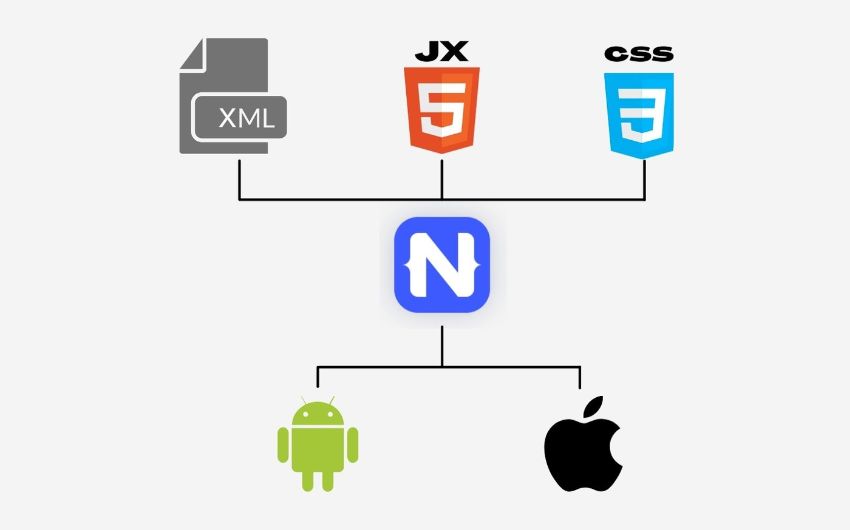
NativeScript allows developers to create native cross-platform apps with ease and speed. NativeScript comes with pre-built components that make development faster than any other platform available on the market today.
- Ionic
Ionic is an open-source cross platform framework for building native and progressive web apps. It is developed by the team behind the Cordova project.
Ionic is an extremely popular framework among developers, it has a huge community of developers and learners.
It’s not just a programming language like JavaScript or TypeScript but also a mobile app development framework with a big community of contributors.
The benefits of Ionic Cross Platform framework include speed, simplicity and ease of use. It also has a great community support and a lot of frameworks and plugins that can be integrated with it.
What Are The Benefits Of Having A Cross Platform App Development Framework?
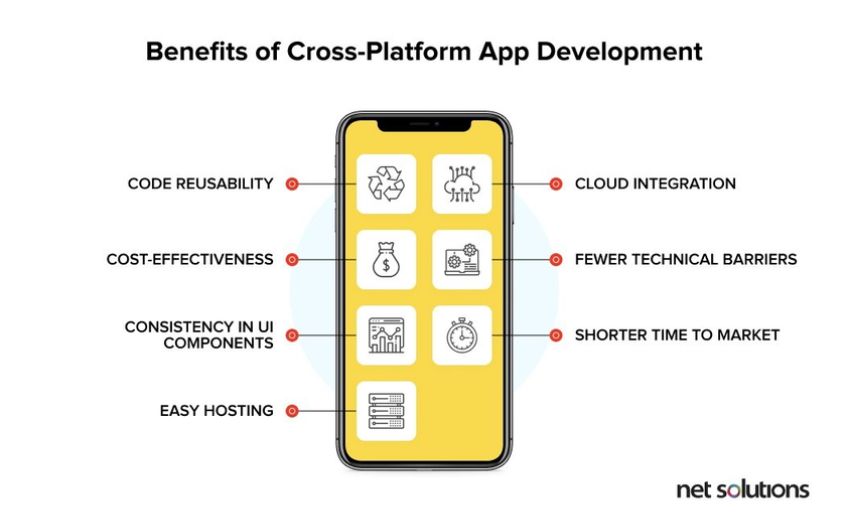
- Code Reusability
The largest upsides of the cross-platform application development framework may be their reusability. Developers can only code once to use it on multiple platforms and reuse it as needed. It is commonly known as “Write Once Runs Anywhere” and is also called WRA. WORA reduces repeat and reduces operational costs. The shared codebase also allows putting together an additional platform in the future without much time and resources.
- Reduced Costs And Resources
The crossplatform app development framework helps you find a balanced balance between quality and cost through a flexible approach that uses fewer developers and focuses on a single skill set for multiple platform development and code bases. The basic math: The lower the cost of developing an app, the less time, resources, and efforts are needed by the user.
- Easy Integration With Cloud
Mobile apps across platforms are completely compatible; they can use different plugins integrated into cloud settings. The code contains several extensions to enhance its stability and scalability.
- Maximum Exposure To The Target Audience
A mobile-based platform approach provides your developer a platform for creating a website or application that is sent through different platforms, including the Internet. This implies that in developing the app, a developer can target either iOS or Android platforms, thus extending its reach.
- Reduced Development Costs
It is important for developers to think about cross-platform applications that are ‘created one time and run across a whole lot.’ Reusable programming code or agile development using the software may lower development costs. It would be impossible to choose another platform to build a profitable cross platform application for your business.
- Quicker Development Process
A quick and flexible development process provides an additional mutual benefit for developers when developing multi-platform apps. One source code in a number of platforms can help reduce developer time from a single source. This helps in developing an efficient business application within fewer days. The developer team is capable of meeting the anticipated deadlines for crossplatform application development.
- Faster Time-To-Market And Customization
The concept of writing once and running everywhere is adopted during cross-platform app design. The solution will help app developers reduce the time in the market (TTM). If a product needs to change in some way, the developer could make a small change to just one code. It helps customers get the product faster by reducing costs and increasing customer engagement.
- Easier Maintenance And Deployment
In cross-platform app development, one universal application can be used for any platform in the application. So the code can be kept and deployed easily when changes happen. The update will be automatically synced with all platforms to save time. A bug that is found in a common codebase is not resolvable. Developers can save money.
- Uniform Design
Cross-platform framework helps simplify user interaction between various platform versions with the exception of a single platform-specific UI if needed. It is important that users experience a consistent interface, which makes it possible to easily identify apps across all platforms and interfaces.
Challenges In The Cross-Platform App Development Process
Until recently, mobile applications were restricted in the realm of simple mobile apps and games. With technology advances, cross-platform developers can adapt to their needs more quickly. However, cross-platform development remains challenging; these difficulties are minimal, in contrast to benefits attributed to cross-platform app development.
Cross-platform mobile development increases the complexity of coding as different devices have unique capabilities and constraints. Additionally, building one app for two or more platforms can require significant time in the prototyping and design phase.
Concluding Thoughts
Cross-platform app development is popular due to its ability to eliminate coding efforts on different devices. Apps across devices can run smoothly. It must also include a cross-platform framework. What platform is a perfect platform for developing mobile applications, and how should we choose it? Simple: depending on a business or application functional requirement. Consult a highly qualified app development firm for a comprehensive list of options for your project.
Many websites have developed a mobile app as a way to stay competitive against other sites. Cross platform development provides a more efficient way for businesses to build applications that are compatible with all customers’ devices. It will help you to learn how to build your ideal app using a hybrid framework.
Brainvire specializes in offering cross-platform software development services, which include development, consultancy, and support. Our solutions are adapted to the specific demands, therefore the client always receives the right product at the right time.
Frequently Asked Questions
How To Choose The Appropriate Hybrid App Framework?
The best solution for hybrid software development depends on a range of factors, and the following is the most significant. For a simple application, you can choose Ionic for your company. Big companies, agencies, and enterprises looking for high-performance solutions might use Sencha Xamarin or other hybrid applications development software. Similarly, the native app development process is best suited to your needs unless you prioritize smooth performance or native capabilities.
What Is The Difference Between Native And Cross-Platform App Development?
The thorny battle between cross-platforms versus natives is the subject of endless debates that divides the tech community. Some experts favor native apps over cross-platform apps.
For example, a new Uber-branded app framework is being redesigned to help users to help drivers. Native as well as cross-platform development technologies evolve constantly. Changing technology signifies that such a topic needs to be reviewed to see which of these alternatives leads this game.
What Is A Cross Platform App Development Framework?
For a brief description, cross platform software has the capability to operate on various computing platforms. The apps built using these frameworks do not require coding for each platform. Instead of coding once will provide an ideal base to run efficiently across multiple platforms. It’s a common method for app development that almost every mobile development company uses. This guide provides comprehensive information to help developers with the development of mobile apps.
What Is The Best Cross-Platform Mobile Development Framework?
React Native is one of the top-quality frameworks for mobile applications for the cross-platform development of apps.
Other popular frameworks are:
- Flutter
- Ionic
- Xamarin
- NativeScript
- Node.Js
- PhoneGap
- Accelerator Titanium
- Corona SDK
- Sencha Touch
Related Articles
-
How to Build a Successful Mobile App that Generates Income?
In this article, you’ll learn: How to get started with app monetization The analysis of the chosen business model How to develop a making money apps strategy that works for
-
Tips to Improve Your Business Efficiency and Productivity with Mobile Apps
It’s the technology era and everyone out there wants to embrace technology in the best possible way for their benefits. So are the businesses that are now-a-days targeting the mobile
-
Key Spotify Statistics Driving Music Streaming Adoption In 2023
The resulting reorganization of the music industry began with a pure campaign against content piracy. Spotify has been more than just a music streaming site. Its acquisition and diversification initiatives



